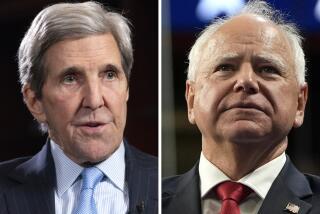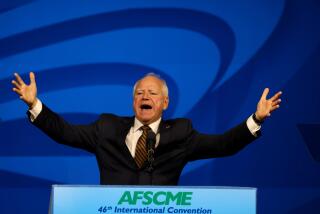Forward March Double Time as Clark Throws Hat in Ring
- Share via
LITTLE ROCK, Ark. — As retired Army Gen. Wesley Clark formally entered the Democratic presidential race on Wednesday, his advisors scrambled to organize his campaign and craft a strategy to overcome the long head start of his nine rivals for the nomination.
Surrounded by hundreds of supporters bearing signs that read, “The Wes Wing,” “The General Election” and “Women for Wes,” Clark promised to “talk straight to the American people, because they deserve to hear the truth, in plain and simple language.”
Although his short speech outside a Boys and Girls Club in Little Rock offered few specifics, the former NATO supreme allied commander began clarifying his views on a range of domestic issues during interviews with the media. Clark said he supported legalized abortion and civil unions for homosexuals -- though not gay marriage -- and would roll back only the provisions of President Bush’s tax cuts that benefit the affluent.
In comments before his speech, Clark said his campaign would have three broad priorities: increasing job growth, finding “the right strategy for ... the war on terror to help us regain America’s constructive role in the world” and building “open, honest, transparent, good government.”
As Clark moved to fill in his political profile, a team of supporters -- notable for its concentration of friends and former aides to President Clinton -- began the formidable task of staffing and financing a campaign that can compete with nine other candidates who, in most cases, have been running for more than a year.
“There’s no structure; that’s the greatest challenge,” said one advisor to Clark.
Along with building an organization and raising money, Clark must find a clear niche in a crowded race that features contenders representing the spectrum of ideological views within the party.
Clark’s opposition to the war in Iraq, which he reaffirmed Wednesday, should prove appealing to the Democratic left. On most issues, though, those around him expect Clark to take relatively centrist positions similar to Clinton’s.
In his speech, Clark also hinted he may target the sort of less partisan voters who fueled the presidential campaigns of independent H. Ross Perot in 1992 and Sen. John McCain (R-Ariz.) in 2000. “In this campaign, we’re going to bring people together ... not just Democrats, but independents and Republicans too, and especially those who have never participated before,” he declared.
Clark’s advisors include Mickey Kantor, a lawyer who was a Clinton Commerce secretary and his campaign chairman in 1992; businessman Eli Segal, the chief of staff for Clinton’s 1992 campaign; Bruce Lindsey, a White House counselor to Clinton; and Skip Rutherford, president of the Clinton Presidential Foundation.
Allies of former Vice President Al Gore also are represented. These include Ron Klain, a deputy White House counsel for Clinton who later served as Gore’s chief of staff; Mark Fabiani, a former communications aide to both Clinton and Gore; and Donald Fowler, a onetime Gore aide who works for TechNet, a bipartisan political group representing the high-tech industry.
Fabiani and Fowler appear to be taking on the most direct operational responsibilities, sources say. But Clark entered the race without a campaign manager, a pollster or a media consultant.
Some of those advising Clark agree the late start will probably force the campaign to make tough choices in its use of time and money. For instance, these advisors say Clark may place more emphasis on making a strong showing in New Hampshire’s Jan. 27 primary than the Iowa caucuses on Jan. 19. Doing well in the caucuses requires enormous organizational effort. Also, New Hampshire historically has also been more hospitable than Iowa to outsider and centrist candidacies.
“He will compete in Iowa in terms of going to debate there ... but probably focus on New Hampshire and beyond that,” one of his advisors said. “Where I think he breaks out is South Carolina, Oklahoma and Arizona.”
Those relatively more conservative states hold their primaries on Feb. 3.
Clark on Wednesday sent an e-mail asking for help from the nearly 50,000 people who signed up on a Web site devoted to drafting him for president. John Hlinko, co-founder of the Draft Clark 2004 for President Committee, said the group contacted the 9,000 people who pledged to provide Clark $1.8 million in contributions if he ran.
“We intend to get a whole lot more,” said Hlinko, a Washington-based political consultant.
Clark likely will need a whole lot more: by Sept. 30, former Vermont Gov. Howard Dean is expected to report that he’s raised at least $20 million this year. And Sens. John F. Kerry (D-Mass.) and John Edwards (D-N.C.) should be relatively close behind in total receipts.
Clark’s supporters were active on Capitol Hill on Wednesday. Rep. Charles B. Rangel (D-N.Y.), a prominent African American leader, has come out for Clark; so has first-term Rep. Rahm Emanuel (D-Ill), the White House political director under Clinton.
“Running for president is about communicating the attributes of strength, optimism and confidence; he does that,” Emanuel said.
Clark’s brief speech gave only limited indications of how he may run in 2004. He drew attention to his military background when he told his supporters: “Get ready. We’re moving out!”
But perhaps tellingly, he devoted as much energy to indicting Bush’s economic record as his approach to foreign policy.
“We’ll ask the tough questions as we move forward, and we’ll hold this administration accountable,” Clark declared to loud cheers. “Why has America lost 2.7 million jobs? Why has America lost the prospect of a $5-trillion [federal budget] surplus and turned it into a $5-trillion deficit that deepens every day? ... Why has America lost the respect of so many people in the world?”
With each rhetorical question, the crowd bellowed back: “Bush!”
In his interviews, Clark stressed his opposition to the war in Iraq, which he called an “unnecessary war.”
“There was no imminent threat,” he said on ABC’s “Good Morning America.” “There was no reason to do this. We could have taken it to the U.N.”
On domestic issues, Clark sided with Kerry and Edwards in denouncing calls by Dean and Rep. Richard A. Gephardt of Missouri to repeal all of the Bush tax cuts, including those that benefit middle-class families. Clark said on the ABC show, “We cannot roll back the tax cuts for ordinary Americans.”
*
Neuman reported from Little Rock, Brownstein from Washington.
More to Read
Get the L.A. Times Politics newsletter
Deeply reported insights into legislation, politics and policy from Sacramento, Washington and beyond. In your inbox twice per week.
You may occasionally receive promotional content from the Los Angeles Times.










